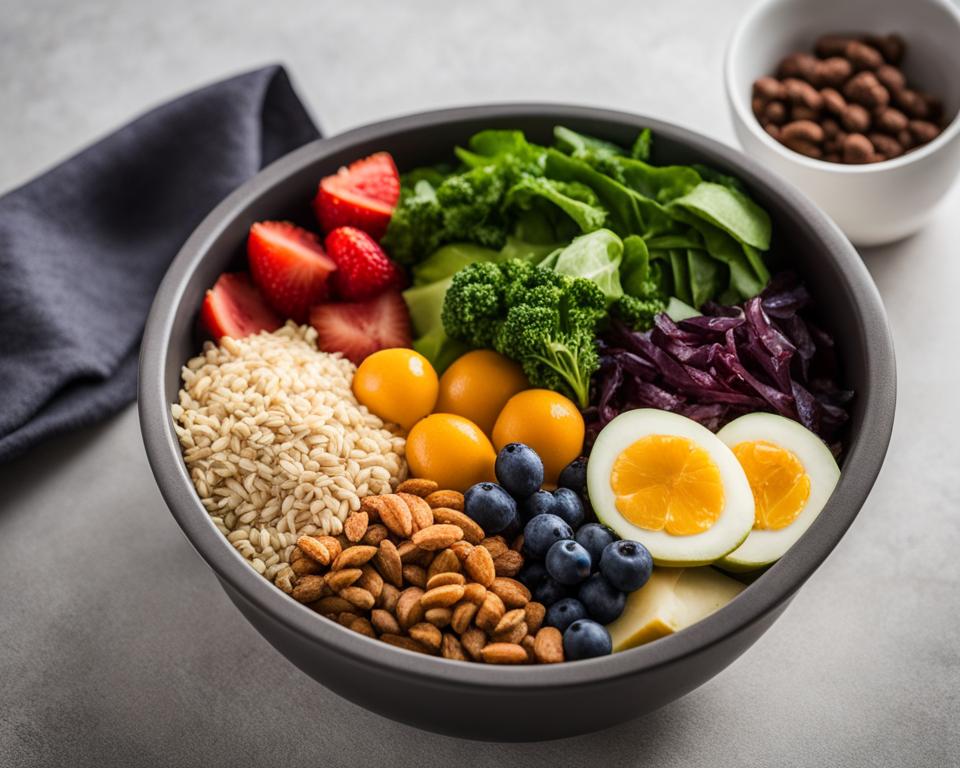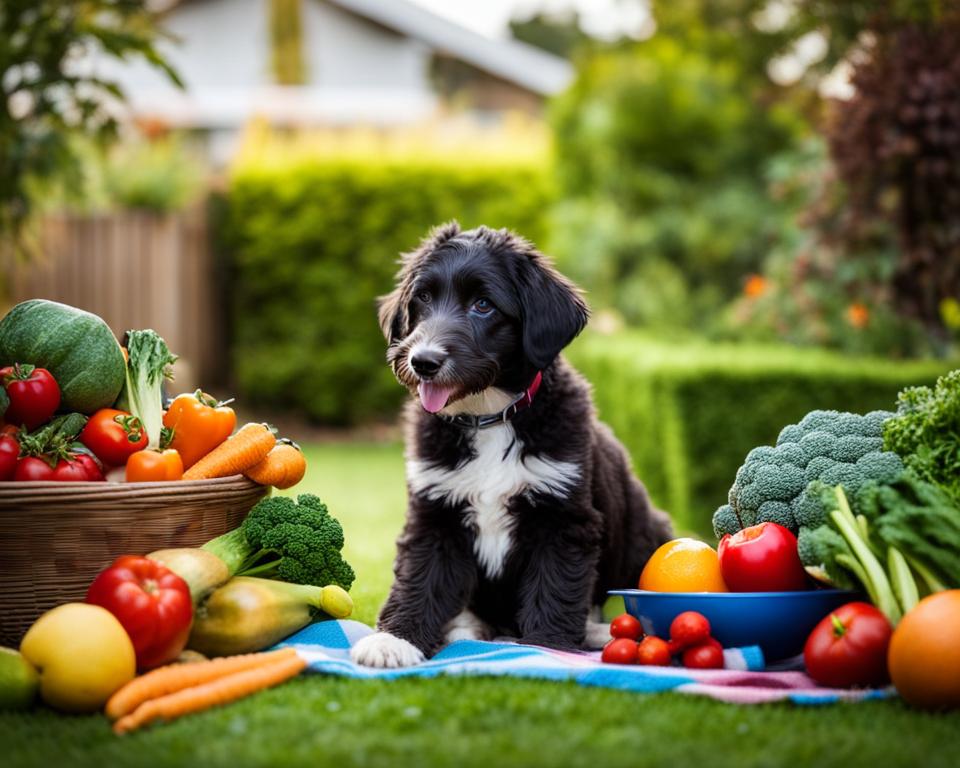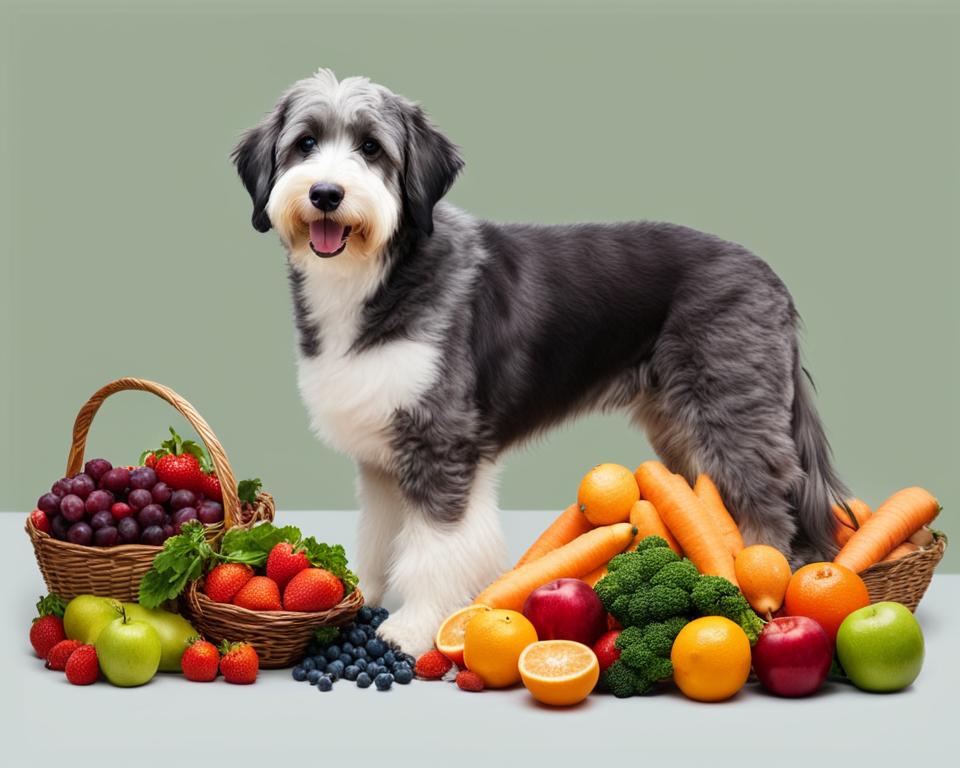The Aussiedoodle, a popular designer dog breed that combines the Australian Shepherd and Poodle, requires a well-balanced diet to support their overall health and well-being. Choosing the right food based on their age, activity level, and any specific dietary requirements is crucial for their optimal nutrition. In this article, we will discuss the best diet for Aussiedoodles and provide tips for ensuring their dietary needs are met.
Key Takeaways:
- Proper nutrition is essential for the health of your Aussiedoodle.
- Consider their age, activity level, and specific dietary requirements when choosing their food.
- Avoid grains and sugars in their diet and opt for higher quality options such as wet food or BARF.
- Regularly monitor their weight and adjust the amount of food accordingly to prevent obesity.
- Maintain their dental health through regular brushing and dental care.
Feeding Guide for Aussiedoodle Puppies
Proper nutrition plays a vital role in the growth and development of Aussiedoodle puppies. Choosing the right food and establishing a feeding routine are essential for ensuring their overall health and well-being. Here is a comprehensive feeding guide to help you navigate the dietary needs of your furry friend.
Recommended Food for Aussiedoodle Puppies
When selecting food for your Aussiedoodle puppy, it is important to choose a high-quality puppy formula that is specifically designed to meet their nutritional requirements. NutriSource Puppy Small Medium Breed Puppy is a reputable brand that provides the necessary nutrients for their growth and development. This food contains high-quality protein sources, essential vitamins and minerals, and the right balance of carbohydrates and fats to support their energy needs.
It is advisable to feed NutriSource Puppy Small Medium Breed Puppy until your Aussiedoodle puppy reaches about 1 year of age. Follow the feeding guidelines provided on the packaging, but keep in mind that individual puppies may have varying appetites and activity levels. It is important to monitor their weight and adjust the portion size accordingly to prevent underfeeding or overfeeding.
Transitioning to New Foods
If you decide to switch your Aussiedoodle puppy’s food to a different brand or formula, it is recommended to do so gradually. Sudden changes in diet can lead to digestive upset and discomfort. Start by mixing a small amount of the new food with their current food and gradually increase the ratio over the course of a week or two. This gradual transition will help their digestive system adjust to the new food without any issues.
In addition to regular meals, providing your Aussiedoodle puppy with natural, puppy-friendly treats and appropriate vitamins can contribute to their overall health and happiness. Always consult with your veterinarian for personalized advice and recommendations based on your puppy’s specific needs.
| Age | Feeding Frequency | Portion Size |
|---|---|---|
| 6-12 weeks | 4 times daily | ⅓ – ½ cup per meal |
| 3-6 months | 3 times daily | ½ – 1 cup per meal |
| 6-12 months | 2 times daily | 1 – 1 ½ cups per meal |
Note: The provided table is a general guideline, and individual puppies may have different dietary needs. Always monitor their weight and consult with your veterinarian for personalized recommendations.
Proper Nutrition for Adult Aussiedoodles
As your Aussiedoodle matures into adulthood, it is crucial to prioritize their nutrition to ensure optimal health and well-being. Their dietary requirements may vary based on factors such as age, activity level, and overall health. By providing a balanced diet, you can help support their energy levels, maintain a healthy weight, and promote overall longevity.
Nutrition Tips for Aussiedoodle Owners
When it comes to feeding your adult Aussiedoodle, it is recommended to opt for high-quality food options that are specifically formulated for their needs. Consider the following nutrition tips to keep your Aussiedoodle healthy:
- Choose a food that matches their activity level: Active Aussiedoodles may benefit from high-energy food with a higher meat content, while less active dogs may require a diet with a lower caloric content to prevent weight gain.
- Avoid grains and sugars: Aussiedoodles have relatively low instances of food allergies, but it is still advisable to avoid grains and sugars in their diet to prevent digestive issues and promote overall health.
- Consider wet food or BARF: Wet food and Biologically Appropriate Raw Food (BARF) options are often considered higher quality choices, as they provide a range of nutrients and moisture that can benefit your Aussiedoodle’s overall well-being.
- Monitor weight and adjust portions: Regularly check your Aussiedoodle’s weight and adjust their food portions accordingly to prevent obesity and maintain a healthy body condition.
By following these nutrition tips and providing a well-balanced diet, you can ensure that your adult Aussiedoodle remains healthy and thrives throughout their life.

Aussiedoodle Care and Grooming
Proper care and grooming are essential for maintaining the health and well-being of your Aussiedoodle. This intelligent and playful breed requires regular attention to their coat, ears, and teeth to prevent any potential health issues.
Grooming the Coat
Aussiedoodles typically have a medium-length, wavy or curly coat that requires regular brushing to prevent matting and tangling. Use a slicker brush or a comb with wide-spaced teeth to gently remove any knots or tangles. Regular brushing also helps distribute the natural oils in their coat and keeps it looking healthy and shiny.
Bathing should be done as needed, using a dog-friendly shampoo and conditioner. Avoid over-bathing as it can strip their coat of essential oils and cause dryness. After bathing, make sure to thoroughly dry their coat to prevent moisture-related skin issues.
Caring for Ears and Teeth
Aussiedoodles are prone to ear infections due to the hair that grows in their ears, which can trap moisture and bacteria. Regular cleaning and plucking of hair should be done to maintain ear hygiene. Use a veterinarian-approved ear cleaner and gently wipe the inner parts of the ears with a cotton ball or a soft cloth.
Dental care is also crucial for Aussiedoodles. Regular brushing with a dog toothbrush and toothpaste helps prevent dental problems such as plaque and tartar buildup. Providing dental chews or toys can also help keep their teeth clean and healthy.
Regular Veterinary Check-Ups
While regular grooming practices are important, it is equally vital to schedule routine check-ups with a veterinarian. Vaccinations, worming, and thorough examinations can help identify any potential health issues early on and ensure that your Aussiedoodle receives appropriate care and treatment.

Recommended Accessories for Your Aussiedoodle
In addition to providing proper nutrition and care for your Aussiedoodle, there are several accessories that can enhance their comfort and well-being. These accessories are designed to meet the specific needs of Aussiedoodles and make their daily lives more enjoyable. Here are some recommended accessories:
A Comfortable Dog Bed
Investing in a larger dog bed ensures that your Aussiedoodle has enough space to stretch out and relax. Look for a bed with supportive cushioning to provide optimal comfort for your furry friend.
Durable Stainless Steel Bowls
Opt for stainless steel food and water bowls for your Aussiedoodle. These bowls are not only durable but also easy to clean and maintain. They are also resistant to bacteria growth, ensuring a healthier eating experience for your pet.
An ID Tag and Collar
For the safety of your Aussiedoodle, an ID tag and collar are essential accessories. Make sure to include your contact information on the tag so that your pet can be easily identified if they ever get lost.
Various Toys for Mental and Physical Stimulation
Aussiedoodles are intelligent and playful dogs, and providing them with a variety of toys can keep them mentally and physically stimulated. Look for toys that are interactive and help prevent boredom.
These are just a few of the recommended accessories for your Aussiedoodle. Remember, choosing high-quality and dog-friendly products will contribute to their overall comfort and happiness.
FAQ
What is an Aussiedoodle?
An Aussiedoodle is a designer dog breed that combines the Australian Shepherd and Poodle.
What is the lifespan of an Aussiedoodle?
Aussiedoodles have a lifespan of 12-15 years.
What is the recommended diet for Aussiedoodles?
Aussiedoodles require a well-balanced diet that is appropriate for their age, activity level, and any specific dietary requirements.
Are Aussiedoodles prone to food allergies?
Aussiedoodles rarely develop food allergies, making them relatively easy to feed. However, it is recommended to avoid grains and sugars in their diet.
What kind of food is recommended for Aussiedoodle puppies?
NutriSource Puppy Small Medium Breed Puppy is a recommended brand for Aussiedoodle puppies, providing the necessary nutrients for their growth and development.
When should I switch my Aussiedoodle puppy’s food?
If you plan to switch foods, make sure to follow the transition directions on the bags to avoid digestive upset.
What should I consider when choosing food for adult Aussiedoodles?
The activity level and age of your adult Aussiedoodle should be taken into consideration when choosing the right food. Grain should be avoided in their diet to prevent digestive issues.
How often should I groom my Aussiedoodle?
Regular grooming is important for Aussiedoodles to maintain their coat. Regular brushing helps prevent matting and removes dirt and debris.
How often should I bathe my Aussiedoodle?
Bathing should be done as needed but not too frequently to avoid damaging their skin and coat.
How should I care for my Aussiedoodle’s ears?
Aussiedoodles are prone to ear infections due to the hair that grows in their ears, so regular cleaning and plucking should be done.
What accessories are recommended for Aussiedoodles?
Recommended accessories for Aussiedoodles include a larger dog bed, stainless steel food and water bowls, an ID tag and collar, waste bags for walks, a crate or exercise pen for crate training, and various toys for mental and physical stimulation.

Leave a Reply